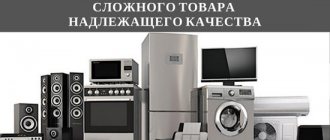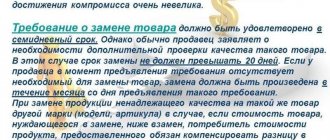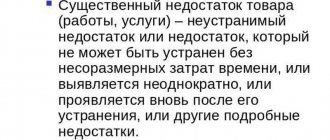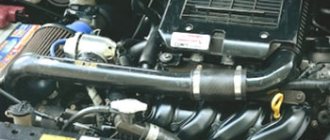Legislation
If disputes arise within the scope of the purchase and sale agreement, the PPA does not work or has only a partial impact on the obligations of the parties. Settlement of mutual claims between the seller and the buyer, if both are legal entities. persons belongs to the field of civil legislation, as specified by the articles of the Civil Code of the Russian Federation. They all belong to chapter thirty. The norms can be divided into the following groups:
- determination of objects of civil legal relations negotiable in the Russian Federation (Article 129 of the Civil Code);
- the procedure, conditions, content and certain aspects of the mutual obligations of the seller and buyer, fixed in the form of the purchase and sale agreement. (Articles 454–468 of the Civil Code);
- product quality, completeness issues, assortment, warranty and obligations under it. Quality control, deadlines, mutual obligations of the parties to compensate for damage. Compliance with the terms and conditions of the agreement by the parties. (Art. 469–485, Art. 518 Civil Code);
- price of the product, the possibility of changing it. Payment and forms depend on the circumstances of the sale and the terms of the relevant contract. Certain aspects of product insurance. (Articles 485–491 Civil Code).
What the law says
Returns between legal entities are regulated by the Civil Code of the Russian Federation in paragraphs of the chapter on purchase and sale transactions (27-30). The Law “On the Protection of Consumer Rights” does not apply in this case, since it regulates the relationship between a legal entity or individual entrepreneur (seller) and an individual (buyer).
The purchase of products occurs by concluding a sales or delivery transaction in writing . Even if the transaction is not formalized in writing, cases of return of products are still regulated by the Civil Code of the Russian Federation. As a rule, only after payment the buyer receives his goods.
Payment is made by bank transfer by transferring funds to the seller's bank account. And the main problem is that the buyer cannot always familiarize himself with the item being purchased. That is why cases of products being returned back between legal entities are quite common.
Reasons for requesting a refund may include:
- purchase of products that do not meet the requirements specified in the contract;
- detection of defects or malfunctions;
- concealment by the seller of the defects of the purchased item.
If the parties initially indicated in the contract about the defects of the product, it is not possible to return such a product.
Return of goods between legal entities
For products that change ownership in one way or another, time periods are defined during which it can be legally transferred to the previous owner.
- Immediately upon acceptance of the product and checking the quality of delivery.
- Warranty period of use, expiration date.
- Thirty days from the date of receipt of the product, if during acceptance it was not possible to conduct a full check of its quality, completeness, and condition of the consumer packaging.
- Until the expiration of two years from the date of receipt of the subject of the contract.
- Reasonable deadlines for assessing the feasibility of a product and characteristics that satisfy the consumer.
Good quality
The law does not contain regulations regarding the return of products for which the buyer has no claims regarding properties and functions. In practice, returning a quality product is very difficult.
Free HOTLINE:
Moscow time 8 (499) 938 6124
St. Petersburg 8 (812) 425 6761
Fed 8 (800) 350 8362
The main obstacle is the lack of conditions for return or exchange in the legislative framework. In some cases, problems that arise are resolved through negotiations between the parties or based on the terms of the agreement.
Poor quality
It is much easier to formalize the transfer of low-quality products to the former owner by proving that defects, damage or other deficiencies were caused to the product before receipt by the organization.
A claim is made against the seller or supplier of the subject of the trade agreement. There is no sample claim statement. The form can be arbitrary, but contain fixed points:
- name and actual data of the organization;
- details of the trade agreement in the field of purchase and sale (supply);
- product name and total quantity;
- established marriage;
- a reasoned requirement to reject a low-quality product;
- separate links to relevant regulatory and legal acts, as well as clauses of the contract that allow the consumer to obtain a quality item in ownership.
In cases where the supplier, when concluding a contract, indicated existing features that reduce the quality characteristics of the product, the recipient does not have the right to use them as a basis for making a claim.
According to the supply agreement
The organization has the right to refuse to fulfill the terms of the contract when delivering products of inadequate quality. You can return the goods to the supplier, except for those circumstances in which the document provides for certain deviations in product quality from existing standards or from the information given in the company’s catalog.
Without an agreement
If the act of purchasing a product was completed without documentary support of the transaction, invoices, incoming and outgoing cash orders, invoices, and paid invoices upon receipt of the product serve as evidence of it.
Important! The buyer is obliged to accept and pay for a product that meets the quality characteristics specified in the text of the contract. Otherwise, penalties are imposed in the interests of the seller. The agreement may provide for the payment of a penalty for violation of deadlines for acceptance of products.
If deficiencies are identified during operation
The same legal norms apply to goods that show poor quality during use as for products that were found to be defective at the time of acceptance. The period for discovery of defects is determined by the concluded contract and must comply with Article 477 of the Civil Code. The claims are valid:
- If the product does not have an expiration date or warranty, requirements are made within 2 years from the date of sale. For goods sent by mail, the reporting date is the moment the buyer receives the goods;
- during the warranty period. If components have a shorter warranty period than the main product, then claims are accepted in accordance with the guarantees for the main product;
- within the expiration date;
- if the product has a warranty period of less than two years, but the buyer can prove that the defects arose before receipt or transfer of the product.
This is also important to know:
Termination of a contract by agreement of the parties: termination procedure, sample agreement
The circumstances under which the goods are returned must be documented, and the procedure for transferring the goods by the buyer to the seller is carried out in a certain manner and has deadlines established by law.
Nuances for the return of goods by a legal entity under the Civil Code of the Russian Federation
Products that are not included in the list of products, the exchange and return of which are prohibited by Government Decree, are subject to transfer to the previous owner.
What is eligible and what is not
Food and non-food products with expired expiration dates, use, storage or expiration of the manufacturer's warranty are subject to return.
You can return goods of inadequate quality, defective, or with damaged consumer packaging. If the delivery conditions imply that the product is complete, and one or more components have lost the established warranty obligations, as well as all or part of the quality characteristics, the product must be returned.
This does not apply to products included in the relevant list by Decree of the Government of the Russian Federation No. 55 of January 19, 1998.
It is impossible to return household appliances with a complex technical device if there is a warranty from the manufacturer, except in cases where their shortcomings are recognized as significant.
Reasons and reasons
There must be a factual basis for returning products to the supplier.
Poor quality:
- claims to the product regarding the quality of material, coloring, production technology, negligence in manufacturing;
- the product arrived with defects, significant defects, obvious malfunctions;
- concealment by the supplier of reliable information regarding existing defects of the product.
Quality:
- violation by one of the parties of the terms of delivery of goods provided for in the current contract;
- issuing a product not covered by the terms of the agreement;
- return of goods if the buyer no longer needs it due to circumstances beyond his control;
- change of ownership, management or repurposing of the buyer’s company;
- The organization has the right to terminate the purchase and sale (supply) agreement in circumstances where it has the need to repay debt obligations to third parties.
Know! When accepting a quality product, the seller has the right to demand compensation from the other party for termination of the contract. The amount of damage suffered by him from the termination of the transaction is determined by an additional agreement of the parties or by the court. The cost of return shipping of the product is paid by the buyer.
Defects detected during operation
The buyer will need to prove that the defect or the prerequisites for its occurrence appeared during the possession of the seller’s product. For these purposes, specialized examinations are carried out with the participation of independent technical supervision bodies.
The expert will provide the necessary evidence that the product was operated in accordance with the requirements and conditions.
If the product is collateral
A pledgor is involved. A report is drawn up based on the results of checking the product for compliance with the required quality characteristics. The product is returned to the seller. The defect report is transferred to the pledgor, after which the buyer is paid the money spent.
Unsold products
If the terms of return are not specified in the provisions of the contract, then the issue is resolved by agreement of the parties in the event that the consumer experiences insurmountable circumstances beyond his control. In addition, unsold products may be returned due to a change in the company's management or its reorganization or repurposing.
Buyer's losses
Financial damage incurred by the buyer is compensated according to the terms of the contract valid between the parties.
When transferring a product of inadequate quality, all costs of the procedure are borne by the previous owner, including the cost of transporting the return cargo.
IMPORTANT! The legislation allocates thirty days to resolve the circumstances associated with the return of a low-quality item of trade. The seller is obliged to consider the claim within three days. Ten days after receiving it, return the buyer's money for the defective product.
Return Policy
In order to return products in accordance with the Civil Code, you need to prepare a package of documents according to the following list:
- a statement of claim addressed to the seller regarding the issue of non-compliance of the product with quality requirements with a comprehensive description of the identified defect;
- payment documents (copies) relating to the subject of the agreement;
- a defect report, which is the basis for the demand put forward to transfer the product to the previous owner;
- invoice for transfer of the product to the supplier;
- the result of an expert assessment based on product research materials.
After receiving a letter of claim, the seller’s organization is obliged to consider it within three days.
After ten days from the date of application to return the product, the buyer’s account receives the money paid for the item of purchase.
All costs associated with returning the product are covered by the seller. This includes commission payments to the bank.
When returning the subject of a dispute under the terms of the contract, the accounting records reflect the proceeds from the sale of the object at the time of transfer of ownership of the goods back to the seller. At the same time, the actual cost of the product is entered on the consumable side. The financial result of the operation is zero. Based on the need to account for income and expenses for the return transaction, the accountant should use account 90 “Sales”.
The procedure for calculating VAT for accounting depends on the type of product and whether it was registered with the buyer.
The seller's transactions are of a similar nature.
Attention! The defendant is given three days to consider the claim. Not according to the general rule, but according to the work routine of a specific organization. If the company receiving the claim is open on Saturday, then this day is taken into account in the total period. If the seller fails to comply with the time frame for considering the claim, he will have to pay a penalty.










